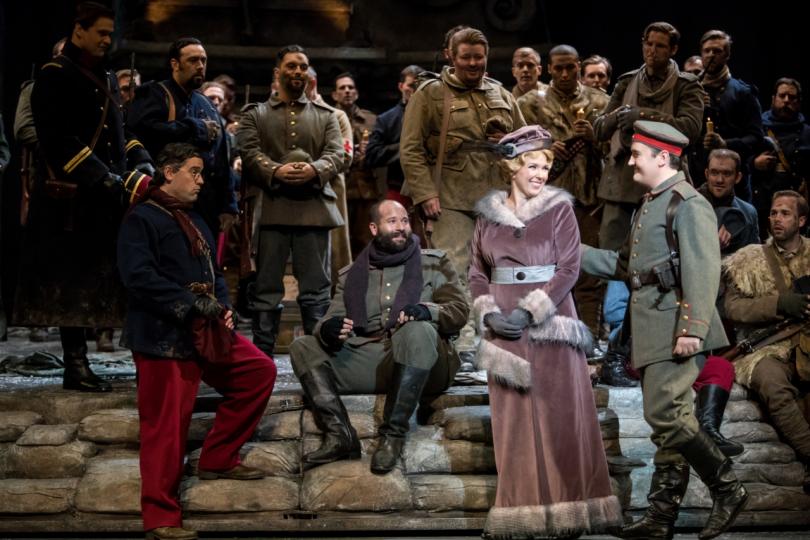Fiercely Gentle

Opera usually tries to be the most extreme version of something. Wagner loved being the most epic, Mozart was usually the most absurd, Puccini is the most sentimental. As a marketing strategy this is a good ploy; make yourself memorable like Ke$ha or Lady Gaga or Meatloaf. But these operatic ‘mosts’ are usually macho, meaning the grandiose nature of opera is normally a means of expressing prowess and cleverness. Silent Night is different. It is absolutely the ‘most’ something but that thing isn’t macho at all. It’s the most gentle. It’s the most trusting. It’s the most hopeful and realistic thing I’ve seen in a long time.
My description is almost a paradox… something being the ‘most gentle’ is similar to it being the ‘most humble’. It seems to contradict itself. How can the quality of gentleness compete against anything to claim itself a victor? How can a behavior considered passive beat its competition? For me, this near-contradiction is the heart of the opera. Silent Night is a story about the small merciful voice inside each of us becoming louder than all the cannons in Europe.
Based on actual events from December 24, 1914 this opera tells the tale of German, French, and Scottish soldiers on the front line of World War I. The story begins with meeting the prospective soldiers in their homes with their wives and families. We see them all as regular people, regardless of which army conscripted them. They’re not caricatures or clichés, they’re all regular people just like you and I. Before long, the horror of war is very real. Terribly realistic violence is played out on the stage and the bodies have to be cleared before fighting can resume. Shortly thereafter (as fateful timing would have it), snow was falling and Christmas Eve had arrived. The Scottish, the French, and the Germans were all feeling the fatigue of fighting and the yearning for anything resembling Christmas. In the yet-infant war the soldiers were newly away from their homes. They were still feeling in tune with their personal desires more than with the tactics of their generals and national leaders.
I just gave away most of the story but I don’t mind ‘spoiling’ the plot of this show because its appeal isn’t in surprises or clever turns. There are no mistaken identities and the story is one that has already been told for over a century. The glory of this production is being in the room while it happens. Being in the Ordway while a choreographed (but very believable) war is fought is more intense than watching Saving Private Ryan on any movie screen. Listening to sworn mortal enemies sing together of how they miss their families on Christmas creates a collective lump in the throats of the 1,000 people around you. There are long scenes after fighting where no soldier is told to ‘buck up’ but rather, is allowed to grieve for the killing they’ve both witnessed and committed. The production is so fully engrossing that I was able to feel tangible emotion in the air. I felt like Ebenezer Scrooge or George Bailey being taken on a supernatural tour. I was a witness to a fully realized world whose sensations and lessons were easy to find.
Compositionally, how do you tell this story of pure hope without becoming a story of pure naivety? This small truce was a blip in the war. It didn’t lead to a movement of ‘Hands Across America’ or generals singing Kumbayah. The war raged on as though this little day had never happened. There wasn’t a clear path into a 1915 world of peace and the opera doesn’t dare create one. We’re shown a dark and troubled world (very much like we have today) with beautiful shining moments of hope (very much like we have today). It is both honest and optimistic. You get to determine your own moral of the story or perhaps just hold on to the memory of those peaceful moments.
The music (this opera was commissioned by MN Opera in 2011 and is back for the first time after being performed internationally over the past seven years) sounds very cinematic. It perfectly creates the tone of each moment in a manner that feels instinctively intriguing to any listener, regardless of their knowledge of other operatic repertoire. A prominent harp, along with pre-recorded bagpipes and harmonica made for very unique and diverse sound.
On-stage, the show is a real ensemble piece. I don’t have a favorite character nor is any single character given preference; which felt quite intentional. It seems like a deliberate choice to elicit empathy for all characters equally, regardless of their army. As an ensemble piece it’s a triumph. The acting, singing, fight choreography, music, rotating set, wildly vivid projections, smoke, costumes, and every other aspect of production was a work of brilliance. I felt fully immersed in every moment of the performance without distraction.
Now, raise your hand if you’ve heard the story of the ‘Christmas Truce’ before. This story is huge! Its most prominent presentation was a movie in 2005 (Joyeux Noel), Theater Latte Da created All is Calm in 2007 (it’s running right now in New York-), MN Opera commissioned Silent Night in 2011, the opera received a Pulitzer prize in 2012 (and also my friend Jake recently released a song about the story). This is the most clear example of zeitgeist I’ve seen in my lifetime. Never before have I seen so many different groups arriving at the same story at the same time. The trend is clear and the verdict is in: we want to believe in this story. We want to believe that even though each one of us is part of a nation, an ethnic group, a history, a political affiliation (etc.) we’re still controlled by something more fundamental than that. It seems we want to believe that our humanity is greater than our institutions. To me, it seems like an era would most desire that story when we’re most in doubt of it…which we absolutely are. In the past 10 years I’ve felt political division grow more and more severe, and I’m clearly not the only one. I’m no historian but I’ve heard it said that our current political division within the United States is 2nd most severe it’s ever been, the only greater time was just before the Civil War broke out. So it’s not a stretch to say it feels like we’re on the verge of a war and we’re hoping our humanity will win before that happens. Perhaps it will if only we have enough reminders to keep thinking of people ‘other’ than ourselves as allies: of persons who also have families and memories and plans and champagne and holiday songs.
MN Opera’s 2018 opening of Silent Night aligned precisely with the 100th anniversary of Armistice Day. 100 years later it feels so quaint that the sworn mortal enemies in this play are actually so similar to one another. The French, German, and Scottish are three European nations, mostly Christian, and (for now) part of the European Union. I hope it takes less than 100 years to write the opera that makes poor relations between the United States and so many countries feel like a quaint memory.
Lastly I’d like to parody the aphorism “There are no atheists in foxholes” for something more specific to Silent Night. “There are no merciless hearts after act 1.” This type of theater that teaches empathy is important. If you’re available Nov. 15, 17, or 18 it’s important that you try to see it. Or, if you can’t get to St. Paul, at least consume one of the other tellings of the story and stretch your empathy a bit.




